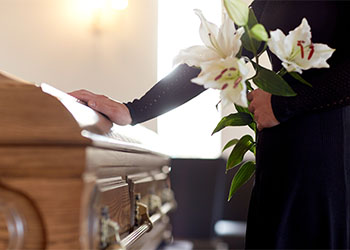What to Do First When a Loved One Dies
March 21, 2023
 Although there’s no amount of planning or arranging that can truly prepare you for the death of a loved one, there are steps you can take now that will help. Sometimes, just knowing ahead of time what will be expected of you can make things more manageable. A key to this may be working with an estate planning attorney. It will likely seem overwhelming at first when you realize the multitude of tasks you’ll have to complete, but an empathetic and experienced attorney can act as your guide and partner during the entire process.
Although there’s no amount of planning or arranging that can truly prepare you for the death of a loved one, there are steps you can take now that will help. Sometimes, just knowing ahead of time what will be expected of you can make things more manageable. A key to this may be working with an estate planning attorney. It will likely seem overwhelming at first when you realize the multitude of tasks you’ll have to complete, but an empathetic and experienced attorney can act as your guide and partner during the entire process.
If you’d like to learn more about the steps to take when a loved one dies, reach out to our team at Law Office Of Corey J. Rossi. We’re able to help individuals and families in and around Tonawanda, New York, including Amherst, Wheatfield, and throughout Erie County and Niagara County. Set up a consultation with us today.
What is the first thing I should do when a loved one dies?
One of the first steps you’ll need to take will be obtaining a legal pronouncement of death. If your loved one died in a hospital, the staff there should help you get this. However, if they passed away at home, you will likely need to call upon a medical professional to legally pronounce the death, then have the deceased moved to a funeral home. In other cases, such as a death while in hospice care, the hospice nurse or medical provider should be able to help you get this document. You’ll need a pronouncement of death for several tasks such as organizing a funeral, accessing accounts and personal information, or disposing of the remains.
Who do I need to notify?
Your next major step will be notifying people of the death. This should begin with the family and close friends who knew the deceased. You may wish to enlist the help of immediate family members in relating the news to others. This can be done through a phone tree, email, or social media sites like Facebook. Next, you’ll want to alert any employers, coworkers, banks, insurance companies, or any other organizations the deceased was affiliated with. Lastly, you’ll need to contact the Social Security office to let them know about the death.
What funeral arrangements should be made?
The type of funeral and memorial service you’ll need or want to organize will be highly dependent on the wishes of the deceased. Find out if the decedent had estate planning documents detailing their final wishes and look to those to see if they outlined directions for this. This could include wishes for a secular or religious service, what kind of memorial they wanted, and finally, what their wishes are for the disposition of remains. If they did not leave instructions behind, you’ll have to make decisions based on what you think they would have preferred. In almost all cases, you’ll be able to use funds from the estate to pay for this, and your estate administration attorney can help you understand how to do this.
What about children and pets?
If there are minor children or pets left at home, they should be cared for immediately by a person (or persons) who know the family well and with whom the children feel comfortable. Ideally, this will be done by a family member who can address the immediate emotional and physical needs of the child. If there is a will in place, it should list a legal guardian (and this can be done for children and pets), who should be notified at once.
Do I need to get death certificates?
It’s usually a good idea to get several copies of the death certificate since many institutions will need this. In most cases, you’ll need to submit these to banks, brokerage accounts, insurance companies, and any other state or federal agencies like the court or the Social Security office.
How is the will or trust handled?
Once the will or trust has been located, the named executor or trustee becomes responsible for administering the contents of the document. For a will, this usually means filing it with the courts and beginning the process of probate, while a trustee will be able to automatically transfer assets over to the named beneficiaries.
Do I need an attorney?
Most people find it helpful to work with an estate attorney or probate lawyer following the death of a loved one. They can help you administer the will, navigate the lengthy process of probate, address any disputes that may arise, and ensure you’ve taken care of all your responsibilities as executor such as paying off back taxes or debts.
Don’t Face This Alone
If you’re in the Tonawanda, New York area and have recently lost a loved one, contact us at Law Office Of Corey J. Rossi for help. You don’t have to feel like you’re all alone in this difficult time. Our team is here to help.
